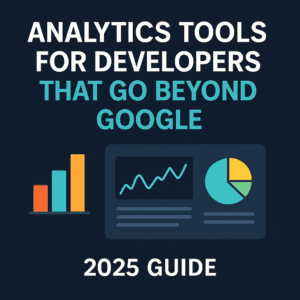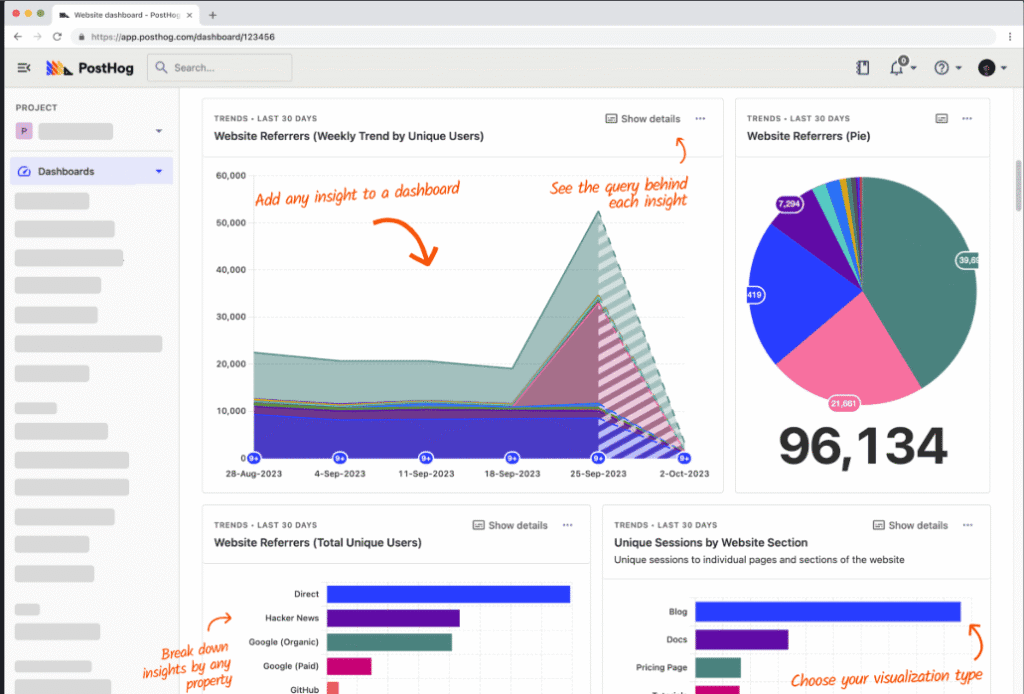
Analytics Tools for Developers That Go Beyond Google (2025 Guide)
Table of Contents
In 2025, developers are rethinking how they track and analyze user behavior. With privacy regulations tightening and Google’s ecosystem evolving, many teams are switching to tools that are more developer-friendly, privacy-focused, and customizable.
This guide explores the top analytics tools for developers in 2025 that go beyond Google Analytics — offering better visibility, cleaner dashboards, and real ownership of your data.
Need Fast Hosting? I Use Hostinger Business
This site runs on the Business Hosting Plan. It handles high traffic, includes NVMe storage, and makes my pages load instantly.
Get Up to 75% Off Hostinger →⚡ 30-Day Money-Back Guarantee
🚀 Why Not Just Use Google Analytics?
| Concern | Reason |
|---|---|
| 🕵️ Privacy | Google Analytics is blocked by many browsers and users. |
| 🧠 Complexity | GA4 has a steep learning curve and limited dev-focused insights. |
| 🔐 Data Control | Hosted by Google; no access to raw data without BigQuery. |
| 🌍 Compliance | GDPR, ePrivacy, and CCPA are pushing devs toward better options. |
🔧 Best Analytics Tools for Developers in 2025
1. Plausible Analytics
- Website: plausible.io
- Type: Open-source, lightweight, privacy-first
- Why Devs Love It:
- No cookies or personal data
- Script under 1KB
- Beautiful, simple UI
- API + self-hosting options
✅ Best for GDPR compliance and blazing-fast dashboards.

2. PostHog
- Website: posthog.com
- Type: Open-source product analytics platform
- Why Devs Love It:
- Session recording, feature flags, A/B testing
- Event tracking via API or frontend SDKs
- Full control with self-hosting on your own infrastructure
✅ Best for full-stack teams and product engineers.

3. Umami
- Website: umami.is
- Type: Lightweight, self-hosted, cookie-less
- Why Devs Love It:
- Simple charts and real-time data
- Open-source and customizable
- Easy to deploy with Vercel, Docker, or Railway
✅ Best for developers wanting minimalist and fast analytics.
4. Ackee
- Website: github.com/electerious/Ackee
- Type: Open-source, Node.js-powered analytics
- Why Devs Love It:
- Self-hosted, zero trackers
- GraphQL API for custom queries
- Great for SPAs and developer dashboards
✅ Best for API-centric teams who want complete flexibility.

5. GoatCounter
- Website: goatcounter.com
- Type: Open-source and hosted options
- Why Devs Love It:
- No cookies
- Lightweight JS
- Friendly for small projects and indie hackers
✅ Best for simple sites, personal blogs, and side projects.
6. Matomo (formerly Piwik)
- Website: matomo.org
- Type: Enterprise-grade open analytics
- Why Devs Love It:
- 100% data ownership
- GDPR tools + consent management
- Ecommerce and custom variable tracking
✅ Best for large teams or businesses migrating away from Google.
Useful Links
- Forget Selenium: Building AI Agents with browser-use & DeepSeek (The New 2026 Standard)
- The End of Localhost? Why Cloud Dev Environments (CDEs) Are Taking Over
- Cybersecurity for AI Workloads: Protecting ML Pipelines in 2025 and Beyond
- AI-Native Grads vs. Traditional Developers: The Talent War CEOs Are Betting On
- Google’s New Ranking Factor Is Quietly Killing Small Developer Blogs (2025 Guide)
- 📛 What Developers Should Stop Doing in 2025 (And What to Do Instead)

📊 Feature Comparison Table
| Tool | Hosting | Privacy-first | Session Replay | API Support | Best Use Case |
|---|---|---|---|---|---|
| Plausible | Cloud/Self | ✅ | ❌ | ✅ | Simple, clean sites |
| PostHog | Cloud/Self | ✅ | ✅ | ✅ | Full product analytics |
| Umami | Self | ✅ | ❌ | ✅ | Lightweight dashboards |
| Ackee | Self | ✅ | ❌ | ✅ | Custom API queries |
| GoatCounter | Cloud/Self | ✅ | ❌ | Limited | Personal projects |
| Matomo | Cloud/Self | ✅ | ✅ (plugin) | ✅ | Enterprise teams |
🔁 Integration Tips for Developers
- Use
fetchoraxiosfor event tracking API calls - Pair with static site generators like Next.js, Astro, Hugo
- Use
noscriptfallback snippets for edge case tracking - For SPAs: hook into router transitions or page events
🙋 FAQs
Q1. Are these tools legal to use without a cookie banner?
Yes — tools like Plausible, Umami, and GoatCounter don’t use cookies or PII, making them GDPR-compliant by default.
Q2. Can I track custom events like button clicks?
Absolutely. Tools like PostHog, Umami, and Ackee support full event tracking APIs.
Q3. Do these work with single-page apps (SPAs)?
Yes — just trigger pageviews manually on route changes and use their JS SDKs or APIs.
Q4. Are any of these free?
All tools listed have free and open-source tiers. Self-hosting gives you full control at no cost.
🧠 Final Thoughts
In 2025, developers no longer have to rely on bloated or privacy-invading analytics tools. Whether you’re shipping an indie project, managing a startup dashboard, or building a web app at scale — these tools offer real insights with full data control.
Say goodbye to Google Analytics — and hello to developer-first analytics.

🚀 Let's Build Something Amazing Together
Hi, I'm Abdul Rehman Khan, founder of Dev Tech Insights & Dark Tech Insights. I specialize in turning ideas into fast, scalable, and modern web solutions. From startups to enterprises, I've helped teams launch products that grow.
- ⚡ Frontend Development (HTML, CSS, JavaScript)
- 📱 MVP Development (from idea to launch)
- 📱 Mobile & Web Apps (React, Next.js, Node.js)
- 📊 Streamlit Dashboards & AI Tools
- 🔍 SEO & Web Performance Optimization
- 🛠️ Custom WordPress & Plugin Development
One comment
Leave a Reply
You must be logged in to post a comment.








[…] user signalsUse privacy-focused analytics (like Plausible, Umami, or your analytics tools guide) to track what users […]